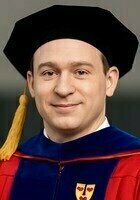
Greg: Rensselaer County tutor
Certified Tutor
I am a teacher passionate about motivating students and investing them in their education to meet their goals and succeed. I have a Masters of Science in Teaching Childhood Education and Special Education, and a background in Political Science and History. I was a teacher for two years in the New York City Department of Education, and over those two years I helped my students attain an average reading growth of 1.5 years/year for each student, and an average math level proficiency growth of 1.3 years/year per student. I have experience teaching students with a wide array of learning needs, and have experience motivating students to enjoy learning and feel inspired to achieve their goals.
I look forward to supporting student learning as a tutor with Varsity Tutors.
Connect with a tutor like Greg
Undergraduate Degree: Emory University - Bachelors, Political Science/History
Graduate Degree: Fordham University - Masters, Masters of Science in Teaching
Exercising, reading, travel, sports
- Algebra
- AP U.S. Government & Politics
- AP United States History
- AP US History
- Arithmetic
- College English
- Contract Law
- Criminal Law
- Elementary Math
- Elementary School Math
- English
- Government
- High School English
- Law
- LSAT
- Math
- Middle School Math
- Pre-Algebra
- Reading
- Social Studies
- US History
- Writing
What is your teaching philosophy?
My teaching philosophy is to individually tailor lessons and activities based on students' academic proficiency levels, and differentiating materials based on their particular learning style. That is, if a student learns best through visuals I aim to use visual aids and cues to support learning activities; similarly, if a student is performing math on a third grade level while in sixth grade, I make sure to tailor activities that meet the student where they are at while scaffolding supports to allow them to do activities on grade level. This may mean practicing multiplying whole numbers before multiplying fractions, or reviewing rules for negative numbers before beginning algebra involving negative numbers. I also aim to invest students by using their interests to drive practice questions and lessons. Through investing students in lessons and making lessons feel relevant to them, I have seen students perform with better success.
What might you do in a typical first session with a student?
Have the student perform a questionnaire that tells me more about them: their goals, their interests/passions, their favorite subjects, and what they feel they struggle with the most. In addition, depending on the subject I would likely have the student perform a diagnostic exam of practice questions so that I can measure the student's current level of academic proficiency.
How can you help a student become an independent learner?
Equip the student with a foundation understanding that aims at comprehension, not just computation. By understanding the core of what a question is asking, a student can break down the question in a way that makes sense to them. In addition, I can teach the student what resources are available to seek additional help independently, i.e., research strategies online and available texts.
How would you help a student stay motivated?
Invest the student in their learning by explaining the importance of their work to achieve their goals. Only through individual investment will a student stay motivated to succeed.
If a student has difficulty learning a skill or concept, what would you do?
Break down the fundamentals of that skill/concept to understand where the difficulty is beginning, and then focus instruction to strengthen those key skills in order to achieve the skill/concept currently being studied.
How do you help students who are struggling with reading comprehension?
Focus on reading comprehension skills that can support their reading: e.g., summarizing after paragraphs; sequencing on the side of the text; visualizing or illustrating sections to understand; self-questioning; searching for the main idea, important facts, and supporting details, and more.
What strategies have you found to be most successful when you start to work with a student?
Invest the student in the work by understanding their goals, understanding their current levels of academic proficiency, and building instruction from there to meet students where they are at while working towards current level goals.
How would you help a student get excited/engaged with a subject that they are struggling in?
Relate that subject to the world around them and explain its relevance. By understanding why a subject is important and how it relates to their life, students become more engaged and eager to learn.
What techniques would you use to be sure that a student understands the material?
Perform intermittent checks for understanding, e.g., use sample problems after any given lesson and provide a small assessment after each lesson is taught.
How do you build a student's confidence in a subject?
Meet the student where they are at in terms of academic proficiency and build from there to find success. Once a student begins to see success in their work, they will become more confident.
How do you evaluate a student's needs?
Through diagnostic assessments and practice exercises.
How do you adapt your tutoring to the student's needs?
Discover which ways the student learns best and where the student is at academically, then create individualized material that utilizes the student's learning strengths to teach new material.
What types of materials do you typically use during a tutoring session?
Guided teaching handouts -- a handout that offers opportunity for me and the student to work together and take relevant notes on the subject area, and then provides independent questions for the student to practice.